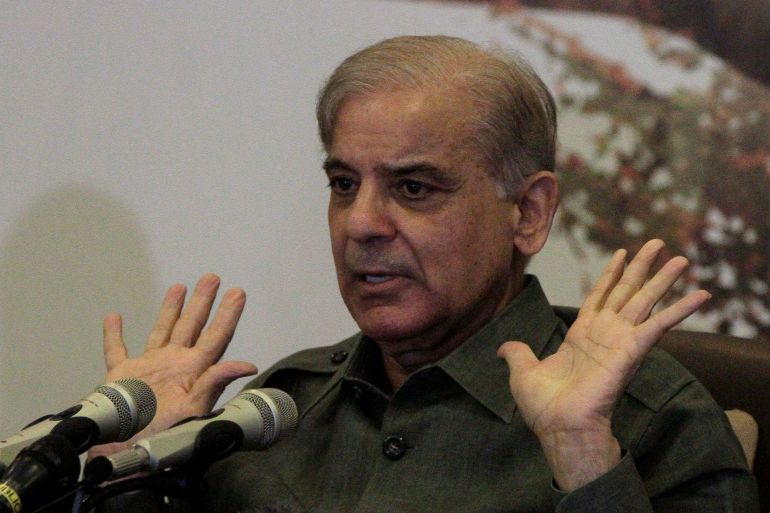Pakistan opposition leader arrested in corruption case
Opposition PML-N leader Shehbaz Sharif is the latest high-profile figure to be arrested as part of PM Khan’s anti-corruption drive.

Islamabad, Pakistan – Pakistani authorities have arrested Shehbaz Sharif, leader of the opposition and president of the country’s main opposition party, on corruption charges, the latest high-profile arrest of an opposition figure by Prime Minister Imran Khan’s government.
Sharif was arrested from the premises of the high court in the eastern Pakistani city of Lahore on Monday, shortly after the court rejected his application for bail in a money laundering case.
A large number of supporters of Sharif and his Pakistan Muslim League-Nawaz (PML-N) political party had thronged the court for the hearing, and they raised chants and slogans against the government and the National Accountability Bureau (NAB), the country’s anti-corruption watchdog, as Sharif was led away by officials.
Sharif has denied all charges, contending that the assets that NAB is probing are in his relatives’ names and that he has no connection to them or how they were acquired.
“Shehbaz Sharif will face all of these false allegations,” said Marriyum Aurangzeb, the PML-N’s spokesperson. “He has spent 70 days in NAB’s custody before … Imran Khan should not believe that we are afraid of these tactics.”
Aurangzeb said Sharif would contest the charges through the courts, and accused the government of arresting Sharif, whose elder brother Nawaz has been elected prime minister three times, each time being removed by either the country’s powerful military or on corruption charges.
“Shehbaz Sharif’s arrest is clearly a way to combat the all-parties conference and it is a reaction to the plans [of the opposition],” she told reporters in Lahore.
Shehbaz Sharif will face all of these false allegations
Speaking to the media, Information Minister Shibli Faraz denied that the verdict was “politically motivated”.

On September 20, Pakistan’s political opposition held a conference to form the Pakistan Democratic Movement (PDM), a new alliance aimed at bringing down the government of Prime Minister Khan, whose Pakistan Tehreek-e-Insaf (PTI) party was voted into power in a controversial 2018 general election.
Khan has made an anti-corruption drive the centrepiece of his rule, with his government pursuing cases against many longtime political leaders, including the Sharifs, former President Asif Ali Zardari, the Jamiat Ulema-e-Islam (JUI-F) group led by Fazl-ur-Rehman, and several members of each of their families.
Critics, including the opposition, say the anti-corruption drive has been one-sided, mainly targeting Khan’s political opponents while leaving members of his ruling party or their allies largely untouched.
“The [anti-corruption watchdog] seems reluctant in proceeding against people on one side of the political divide […] while those on the other side are being arrested and incarcerated for months and years without providing any sufficient cause,” read a Supreme Court verdict in a corruption case in July.
The PTI’s rule has also been marked by narrowing media freedoms, with coverage of opposition figures or criticism of the military restricted.
Criticism of the military
In October 2018, Shehbaz Sharif had been arrested in a separate corruption case related to the award of contracts while he was chief minister of Punjab province, the country’s most populous region, between 2013 and 2018.
He was released on bail four months later but continues to face multiple inquiries.
This month, an Islamabad court cancelled bail for his elder brother Nawaz Sharif, who left the country on medical bail last November and has not returned since.
The elder Sharif was forced to resign in July 2017 after the country’s Supreme Court ruled that he had lied on a parliamentary wealth declaration.
He was later convicted in two corruption cases and was serving a seven-year prison sentence, alongside having to pay hefty fines. He appealed one of the cases successfully but continues to face imprisonment in the other.
Several senior members of his PML-N party have been arrested during Khan’s two years in power, some remaining in custody while others have been released on bail.
At the opposition conference earlier this month, Nawaz Sharif broke his two-year silence and delivered a strongly worded speech that took aim at the country’s powerful military, which has directly ruled Pakistan for roughly half of its 73-year history and is accused of rigging the 2018 elections to bring Khan to power.